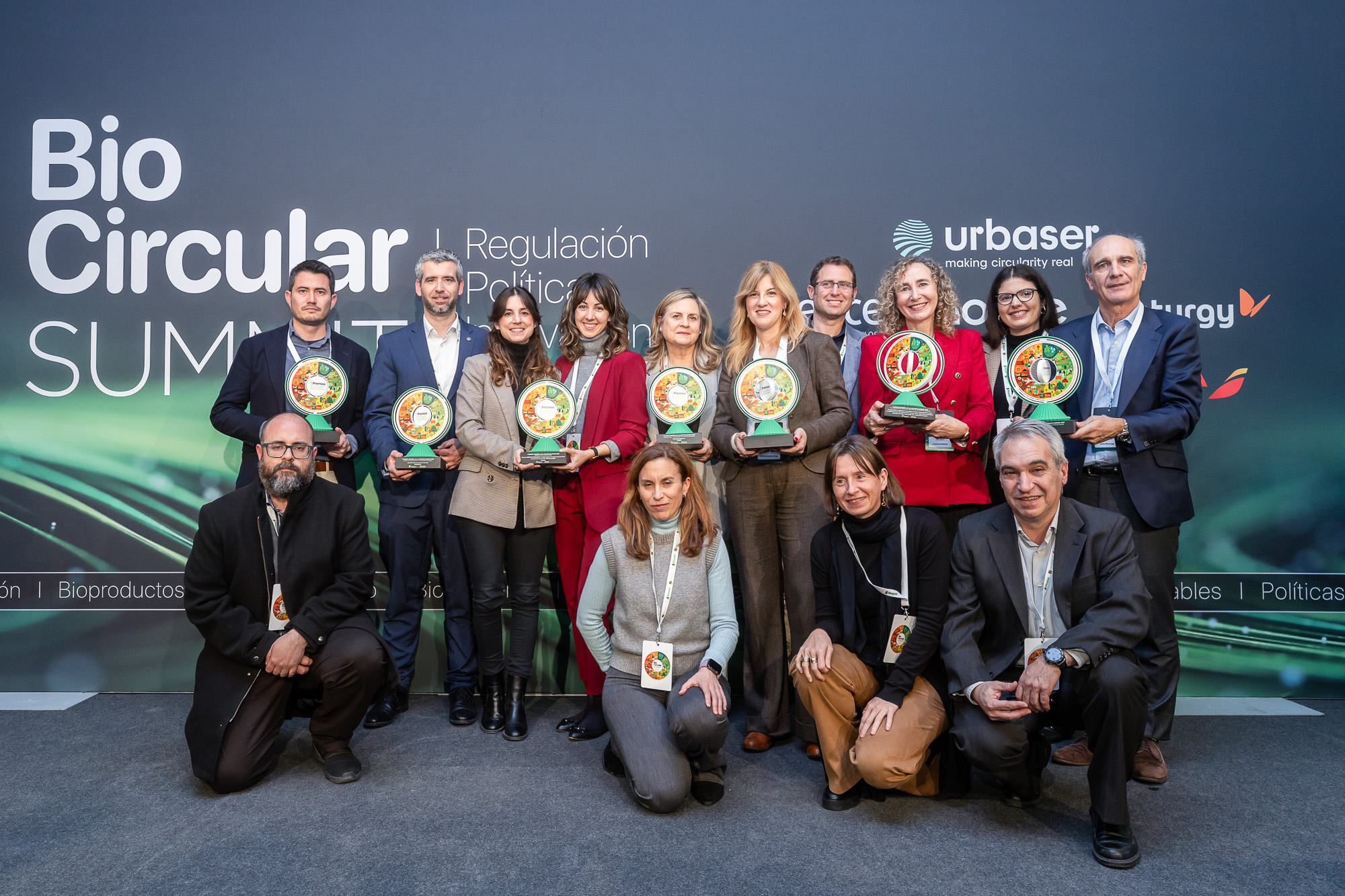NUTRITIVE AT THE BIOCIRCULAR SUMMIT
On February 11, the Biocircular Summit took place in Madrid, bringing together key national and European stakeholders to discuss the latest topics related to biocircularity. The focus was on political and regulatory aspects (energy, fuels, renewable gases, circular economy, waste), related sectors (agriculture, livestock, forestry, various industries), sustainability, positive impact, and innovation.
Held at the Hotel Riu Plaza España, it was a day of complete immersion in circularity and bioeconomy topics, featuring roundtables, policy pills, CEO talks, and showcases with representatives from public administrations and major industry companies. These sessions provided a strategic vision of all key aspects.
In parallel, the First National Biocircularity Awards were presented—an event pioneering biocircularity in Spain. The awards recognized the main leaders driving the transformation towards sustainable biocircular business models, key pillars of our ecological transition. Among seven different categories and over 30 applications, the NUTRITIVE project was awarded the Sustainability and Social Inclusion in Biocircularity Award.
“The NUTRITIVE project aims to decarbonize the livestock sector, mitigating its environmental impact and addressing its effects on rural areas. It is structured around the development of an integrated tool to support livestock farmers in decision-making for manure management. This project enables the evaluation of established and innovative technologies to ensure the sustainability of the value chain.”
Sustainability and Social Inclusion Award
The NUTRITIVE project seeks to decarbonize the livestock sector, mitigating its environmental impact and addressing its effects on rural areas. It is structured around the development of an integrated tool to support livestock farmers in decision-making for manure management. The project allows for the evaluation of established and innovative technologies to ensure the sustainability of the value chain.
The livestock sector plays an essential role in the European Union’s agri-food industry, contributing 1.3% of the European GDP. Spain is one of the leading players in the sector, accounting for 40% of the primary sector. Thanks to foreign trade, Spain has become a major exporter of livestock products, particularly in the pig farming sector.
However, the growth of livestock farms, driven by the sector’s robustness, has led to various environmental challenges. Surface and groundwater pollution, as well as greenhouse gas (GHG) emissions, are among the biggest risks associated with sector expansion due to their impact on human health and local biodiversity. Traditionally, the primary pollutants from livestock activities have been nitrogen, phosphorus, and heavy metals. However, new contaminants with significant effects on human health—such as pathogens and antibiotics—have emerged. Additionally, microorganisms are known to develop antibiotic resistance, particularly in stable selective pressure environments like livestock farms. These antibiotic resistance genes (ARGs) can transfer between microorganisms, posing a public health risk, necessitating the development of appropriate manure management systems.
Within the NUTRITIVE project, several livestock farms have been selected as case studies. Each farm’s environmental impact will be measured, focusing on GHG emissions and pollutants in water, manure, and soil, including heavy metals, nitrogen, phosphorus, pathogens, antibiotics, and ARGs. This will provide a comprehensive overview of the environmental footprint of livestock farms based on their management and location.
The project integrates various innovative livestock waste treatment strategies to remove contaminants and ensure the safety of produced waste. Additionally, the techno-economic feasibility and environmental impact of selected technologies will be assessed. One of the key technologies under evaluation is anaerobic digestion for primary manure treatment. This technology not only enables energy recovery but also stabilizes waste and reduces GHG emissions. The project will further explore its capacity for contaminant removal through the addition of zeolites or biochar. Moreover, there is evidence that this technology can reduce the presence of pathogens and ARGs in waste, which will be studied throughout the project.
Through independent technological evaluation, the NUTRITIVE project will support the implementation of measures to reduce the livestock sector’s environmental impact. The project focuses on empowering farmers with tools for informed and objective decision-making regarding manure management. Additionally, the dissemination of generated data to end-users will promote the adoption of innovative technologies while improving consumer perception of widely used strategies such as anaerobic digestion.


Grant agreement No. 10113540
- Privacy Policy
hello@nutritive.es
Views and opinions expressed are however those of the author(s) only and do not necessarily reflect those of the European Union.
Neither the European Union nor the granting authority can be held responsible for them.


